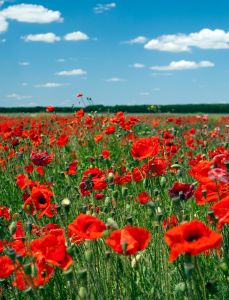 IN FLANDERS FIELDS
IN FLANDERS FIELDS
Baron Halpenny, LincsMag Editor-in-Chief.
Date: 1 November 2009

The immortal poem, 'In Flanders Fields,' was seeded from the simple Corn Poppy ... brought to Europe from the Holy Land ... and has now become the symbol of Remembrance of all those who died in the wars of this century.
In Flanders, the simple, yet beautiful little Corn Poppy grows everywhere. During the First World War, Colonel John McCrae, a Canadian veteran of the South African war, looked out from his water logged trench during a lull in the fierce fighting at the second battle of Ypres... His eyes met the sickening sight of makeshift crosses... rows and rows... the ghastly relics of the first battle which had drenched the battlefield with blood.
The Canadian Medical Officer was struck with admiration at the sight of the little red poppies... swaying gently in the breeze over the graves of the dead.
McCrae was so moved at the sight, he took out his note pad and pencil and wrote the poem...In Flanders Fields.
In 1918, Colonel John McCrae was severely wounded and he was moved from the makeshift front-line field hospital in a dugout to a rear-base hospital near Calais... he had asked to be moved to the coast area so that he could see the white cliffs of Dover from across the Channel.
On the third night he fought his last fight... he succumbed to his wounds... but in the last fleeting seconds before the Reaper called... Colonel McCrae whispered... "Tell them this... if ye break faith with us who die...we shall not sleep." And with that...the gallant Colonel was gone. That very night he was buried in the cemetery at Wimereux.
In November 1918... after four years of almost incessant fighting... came the Armistice. The Great War was over... the terrible carnage was at an end. France had lost its life blood of youth for about seven million had perished.
After the misery of war... the truth that it was all for nothing became very clear when the disabled and shell-shocked Soldiers, Sailors and Airmen were cast-off overnight as unwanted. Touched by the plight of the war disabled, Madame Yvonne Guerin proposed that the women of France should make artificial red poppies and sell them throughout the world in order to raise money for the war disabled, for after all, it was they who had given them their freedom.
In England the idea caught on and Field Marshal Haig proposed a factory, where British Soldiers who, had been injured during the war, could be employed making red silk poppies. Sponsored by the British Legion it brought in much need money for the relief of those disabled in the war.
Today, millions of red poppies are sold throughout Britain. The red petals of the poppy signify the vast ocean of blood spilt... the yellow and black centre for the mud and desolation of the battlefields...the green of the stem is symbolic of the fields where many brave Soldiers fell.